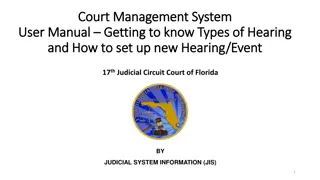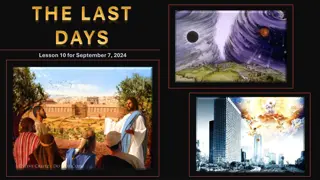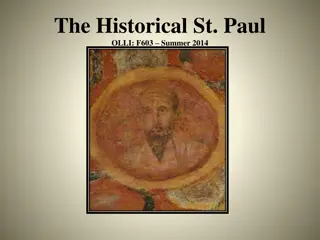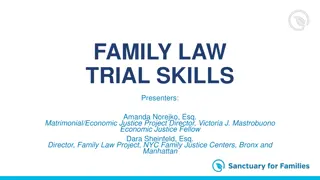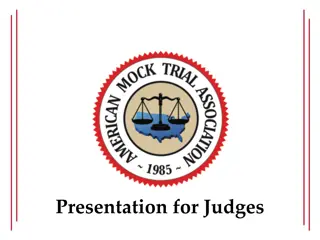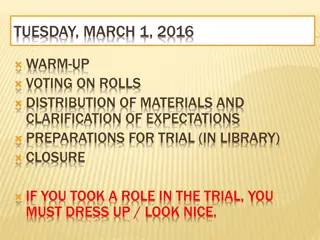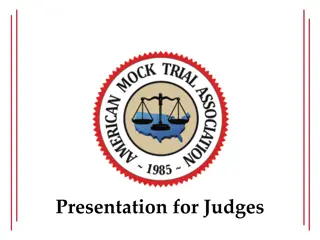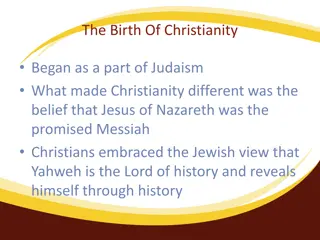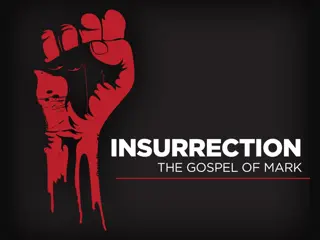The Trial of Jesus before Pilate and Herod
The hearing before Pilate in Luke 23:1-5 presents the Jewish leadership accusing Jesus of perverting the nation and claiming to be a king. Pilate finds no basis for the accusations, but the leaders persist. Jesus' challenge poses a threat not just to the Jewish order but also to Roman peace. The situation escalates when Pilate sends Jesus to Herod, hoping for a spectacle.
Download Presentation

Please find below an Image/Link to download the presentation.
The content on the website is provided AS IS for your information and personal use only. It may not be sold, licensed, or shared on other websites without obtaining consent from the author. Download presentation by click this link. If you encounter any issues during the download, it is possible that the publisher has removed the file from their server.
E N D
Presentation Transcript
Welcome to ENTS on ZOOM Luke 23:1-56
Then the assembly rose as a body and brought Jesus before Pilate. 2They began to accuse him, saying, We found this man perverting our nation, forbidding us to pay taxes to the emperor, and saying that he himself is the Messiah, a king. 3Then Pilate asked him, Are you the king of the Jews? He answered, You say so. 4Then Pilate said to the chief priests and the crowds, I find no basis for an accusation against this man. 5But they were insistent and said, He stirs up the people by teaching throughout all Judea, from Galilee where he began even to this place.
The Hearing before Pilate (23:1-5) The indictment against Jesus: 1) is made concrete before Pilate the Jurist; 2) sums up the Jewish leadership's perspective of Jesus and his teaching distorted at best. Pilate executes Galilean pilgrims (13:1); Jesus and tribute to Caesar (20:20-26); Jesus to handed over to Gentiles (18:32). Jesus challenge is not only to the religiously-sanctioned religious world order of Israel but also to the religiously-sanctioned peace of the Roman Empire. Note that the Jewish leadership is more insightful about Jesus than Pilate ( innocent ) but Pilate does not dismiss Jesus.
The Hearing before Pilate (23:1-5) Jesus' challenge is not only to the religiously-sanctioned religious world order of Israel but also to the religiously-sanctioned peace of the Roman Empire. Note that the Jewish leadership is more insightful about Jesus than Pilate ( innocent ) but Pilate does not dismiss Jesus. vv.1-2, Move to the second phase in the process of Jesus' trial. The indictment perverting the nation is laid and backed up by the prohibition of paying taxes to the Emperor and the claim to Messiahship.
The Hearing before Pilate (23:1-5) Perverting (leading astray) = false Prophet (Deut 13). i.e., Jesus lacked divine authority. To Pilate this would mean rebellion and civil unrest. vv.3-4, Pilate turns to the question of Jesus' royal status. Answer, like in 22:70, is an ironic affirmation. Pilate seems to regard Jesus as a harmless eccentric at this stage. Who are the crowds ? (22:47-54) vs.5, The Jewish leadership push the case even further. Even to this place probably refers to the Temple. The leaders grow increasingly adamant, almost inciting a riot, in the face of Roman unwillingness to act. Not Jesus who stirs up the people.
6When Pilate heard this, he asked whether the man was a Galilean. 7And when he learned that he was under Herod s jurisdiction, he sent him off to Herod, who was himself in Jerusalem at that time. 8When Herod saw Jesus, he was very glad, for he had been wanting to see him for a long time, because he had heard about him and was hoping to see him perform some sign. 9He questioned him at some length, but Jesus gave him no answer. 10The chief priests and the scribes stood by, vehemently accusing him. 11Even Herod with his soldiers treated him with contempt and mocked him; then he put an elegant robe on him, and sent him back to Pilate. 12That same day Herod and Pilate became friends with each other; before this they had been enemies.
The Hearing before Herod (23:6-12) Central role of the scribes and chief priests. Rome's aversion to acting with justice. Herod (in Luke) curious to see Jesus but incapable of understanding him. The tetrarch of Galilee(3:1); Imprisons John (3:19-20); Beheads John, curious about Jesus (9:7-9); desire to kill Jesus (13:31. vv.6-7, Who has domain? Pilate sends to Herod, probably hoping that he has more knowledge about Jesus. vv.8-9, Contrast with appearance before Pilate. Lengthy questions, Jesus' silence. Herod sees and hears nothing from Jesus. Desires to see a sign (11;16; 29-30).
The Hearing before Herod (23:6-12) Jesus' silence is remarkable not just self-control/nobility but reminiscent of the Servant of Yahweh (Isa 53:7). vs.10, Presence of the chief priests and scribes vv.11-12, The Jewish leadership, and their intervention, is the force behind the apparent contempt of Jesus. Brilliant robe ironic mockery. Friends joined together in their hostility to Jesus.
The Sentencing of Jesus (23:13-25) Focus is on Jesus' innocence, the determination of the Jewish leadership Pilate's attempts to keep the crowd happy Eventually giving up by releasing a known criminal and revolutionary.
13Pilate then called together the chief priests, the leaders, and the people, 14and said to them, You brought me this man as one who was perverting the people; and here I have examined him in your presence and have not found this man guilty of any of your charges against him. 15Neither has Herod, for he sent him back to us. Indeed, he has done nothing to deserve death. 16I will therefore have him flogged and release him.
vv.13-16 The People are brought together with the Jerusalem leadership sort of a town meeting. The larger audience gives Pilate an opportunity to test the mood of the people. Jewish leaders align themselves with insurrection. Pilate introduces the idea of capital punishment but the idea of 'false prophet already carries that idea. to flog is a lesser punishment and is used only to maintain favour with the people.
18Then they all shouted out together, Away with this fellow! Release Barabbas for us! 19(This was a man who had been put in prison for an insurrection that had taken place in the city, and for murder.) 20Pilate, wanting to release Jesus, addressed them again; 21but they kept shouting, Crucify, crucify him! 22A third time he said to them, Why, what evil has he done? I have found in him no ground for the sentence of death; I will therefore have him flogged and then release him. 23But they kept urgently demanding with loud shouts that he should be crucified; and their voices prevailed. 24So Pilate gave his verdict that their demand should be granted. 25He released the man they asked for, the one who had been put in prison for insurrection and murder, and he handed Jesus over as they wished.
vv.18-21 Together only usage in the New Testament and asserts the Peoples participation in the execution of Jesus. Barabbas highlights Jesus' innocence. Away with this fellow echoes Isa 53:8. vv.20-21, Crucifixion: cruel punishment, slow and painful death with little blood loss. Public humiliation was a key ingredient. Usually, the crucifixion was held in a very public place. This form of capital punishment was reserved for those who resisted the authority of the Roman occupation. It is profoundly ironic that the people propose this kind of punishment for Jesus.
vv.22-25 vv.22-23, Continued emphasis on the innocence of Jesus. Pilate acts in the end to stop a riotous mob, not to promote justice. vv.24-25, The travesty of the verdict is furthered by the release of Barabbas.
The Crucifixion of Jesus (23:26-49) Jesus is more than a victim, he is in control and his trust in God never wavers. He continues his prophetic ways, intercedes on behalf of those who dishonour and execute him, promises paradise to a criminal and, with his dying breath, offers up his life to God. The seeming unity between the people soon shatters and unusual people recognise Jesus' true identity. Even the death of Jesus is understood in God-centric way.
26As they led him away, they seized a man, Simon of Cyrene, who was coming from the country, and they laid the cross on him, and made him carry it behind Jesus. 27A great number of the people followed him, and among them were women who were beating their breasts and wailing for him. 28But Jesus turned to them and said, Daughters of Jerusalem, do not weep for me, but weep for yourselves and for your children. 29For the days are surely coming when they will say, Blessed are the barren, and the wombs that never bore, and the breasts that never nursed. 30Then they will begin to say to the mountains, Fall on us ; and to the hills, Cover us. 31For if they do this when the wood is green, what will happen when it is dry?
On the Way to the Crucifixion (23:26-31) Luke's concern is what happens on the Way rather than places. Key focus is how the seeming solidarity of the Jewish people is shattered. vs.26, They is ambiguous. However, all factions are aligned at the end of the trial scene. Cross = cross beam. More important is the idea of taking up the cross, 9:23; 14:27. Cyrene, capital of Cyrenaica (Libya). Simon from the country had not participated in the riotous acts associated with Jesus' condemnation. i.e., hostility to Jesus is not universal.
On the Way to the Crucifixion (23:26-31) vs.27, Those who follow not disciples. Women, Zech 12:10-14 vs.28, Daughters of Jerusalem stock phrase for those who inhabit Jerusalem (13:34) Turned to them like Peter in 22:61-62, Peter weeps these women are admonished and called to weep for the failure of Jerusalem to align with Jesus. These women are weeping for the wrong reasons, but also as a precursor to God's redemptive intervention. (6:21, 25; 7:23; 8:52; 22:62) True mourning affords the opportunity to respond to Jesus with repentance.
Jesus Crucified and Mocked (22:32-43) We are spared the details of Jesus' actual crucifixion but given an account of the immediate aftermath. There are 3 phases of mocking: the religious leaders, the Roman soldiers, an executed criminal. There are contrasting responses to Jesus' crucifixion. Even in his most vulnerable moment, Jesus continues to be a saviour. => from the mouth of Jesus' opponents, we repeatedly hear what we know to be true about Jesus
32Two others also, who were criminals, were led away to be put to death with him. 33When they came to the place that is called The Skull, they crucified Jesus there with the criminals, one on his right and one on his left. [[34Then Jesus said, Father, forgive them; for they do not know what they are doing. ]] And they cast lots to divide his clothing. 35And the people stood by, watching; but the leaders scoffed at him, saying, He saved others; let him save himself if he is the Messiah of God, his chosen one! 36The soldiers also mocked him, coming up and offering him sour wine, 37and saying, If you are the King of the Jews, save yourself! 38There was also an inscription over him, This is the King of the Jews.
vv.32-34 We do not hear the stories of the other criminals. The horrible events happening to Jesus do not, however, jeopardise his relationship with the Father . He continues to intercede for them - both Romans and Jews. Jesus lives out 6:27-28, pray for those who abuse you. Ps 22:18 cast lots highlights the gross indignity that Jesus has suffered.
vv.35-38 People are watching and are segregated from the Leadership who mock Jesus. Scoff Luke borrowing from Ps 22:7. Jews mock Jesus as a Messiah of God, the Romans speak of the king of the Jews. Chosen One (Isa 42:1) echo how God refers to Jesus in 9:35.
vv.35-38 They want Jesus to self-deliver himself when in actual fact it is God who saves, Ps 22. Sour wine continues mockery of Jesus' status as king. vs.38, Inscription is a warning to those who might do likewise. Jesus is accused of trying to take the place of the emperor. Further sneering at Jesus as Pilate has already rejected Jesus' kingship (3-4) and so has Herod (11).
39One of the criminals who were hanged there kept deriding him and saying, Are you not the Messiah? Save yourself and us! 40But the other rebuked him, saying, Do you not fear God, since you are under the same sentence of condemnation? 41And we indeed have been condemned justly, for we are getting what we deserve for our deeds, but this man has done nothing wrong. 42Then he said, Jesus, remember me when you come into your kingdom. 43He replied, Truly I tell you, today you will be with me in Paradise.
vv.39-43 (The third mockery) One criminal aligns with Rome and the Jerusalem elite, one with Jesus. The first blasphemes Jesus. He is unable to (1) fear God. Rather he maligns God's instrument of salvation. (2) He assumes Jesus is guilty, when he is actually innocent. (3) In his sarcasm, he fails to recognise that the suffering righteous one will be delivered through death (not from death) and will continue to exercise his role as Saviour.
vv.39-43 (The third mockery) The second criminal acts like Peter (5:8) and is thus a candidate for divine generosity. He is able to speak to Jesus by name and demonstrates deep insight into Jesus. The Criminal is the first to recognise that Jesus' death is NOT a contradiction of his messiahship and role as Saviour. He is the first to recognise that Jesus' crucifixion is a precursor to his enthronement.
The Death of Jesus (23:44-49) The actual death is given little attention (vs.46) The emphasis is on the events before and after: the darkness, the rending of the temple veil, outcry before death, the effect of the death on the centurion, the crowds and the followers of Jesus. Most important is Jesus' continued faith in the Father. Those who were responsible for these events are relegated to the background. The seeming demise of Jesus leads to the widening of the divine purpose and the mission to embrace others.
44It was now about noon, and darkness came over the whole land[l] until three in the afternoon, 45while the sun s light failed; and the curtain of the temple was torn in two. 46Then Jesus, crying with a loud voice, said, Father, into your hands I commend my spirit. Having said this, he breathed his last. 47When the centurion saw what had taken place, he praised God and said, Certainly this man was innocent. 48And when all the crowds who had gathered there for this spectacle saw what had taken place, they returned home, beating their breasts. 49But all his acquaintances, including the women who had followed him from Galilee, stood at a distance, watching these things.
The Death of Jesus (23:44-49) vs.44-45, The time is introduced. Darkness more than just an extraordinary sign but speaks of the diabolical hate of God's purpose and thus of Jesus. Gives a cosmic dimension. Darkness will give way to the spread of light (Acts 26:18) The curtain of the temple God turning away from the temple to accomplish his purposes by other means not to Jerusalem but from it and to the end of the earth . (Acts 1:8) vs.46, Father (Ps 31:5) God is still present despite the darkness and the tearing of the curtain. Jesus show absolute trust in that God. vv.47-49, Centurion and crowds respond. Jesus' prayer has results and people gain insight into their status before God.
The Death of Jesus (23:44-49) Roman soldiers: play a part in Jesus' death; respond to the good news (3:10-14); centurion as an example of faith (7:1-10). Praise God is a recognition of the salvific hand of God. Crowd s response: must also be seen positively. They have begun to distance themselves from the leadership. Beating their breast suggests sorrow and mourning, like vs.27 and the humble justified tax collector (18:9-14).
The Death of Jesus (23:44-49) All his acquaintances disciples and apostles (absent since 22:47-53). Women following him since Galilee (8:1-3). They have a crucial role but, like Peter (22:54), are distanced from Jesus. Will they remain faithful, as Peter did not? Comparisons are also invited with Ps 38:11, remaining aloof from my affliction. However, they remain with Jesus. What will be the future of God's purpose now that Jesus has died?
The Burial of Jesus (23:50-56) Jesus may have been rejected by the Jewish leadership and assisted by the people (vs13-25); Jesus may have prophesied the destruction of the Jerusalem (vs28-31) and God may have rendered the view of the temple and invalidated the sacred authority of the temple (vs45) But this is not a blanket condemnation of Israel. The people express remorse (vs48). The actions of Joseph and the women are those of people honouring Jesus one who was executed as a criminal.
50Now there was a good and righteous man named Joseph, who, though a member of the council, 51had not agreed to their plan and action. He came from the Jewish town of Arimathea, and he was waiting expectantly for the kingdom of God. 52This man went to Pilate and asked for the body of Jesus. 53Then he took it down, wrapped it in a linen cloth, and laid it in a rock-hewn tomb where no one had ever been laid. 54It was the day of Preparation, and the sabbath was beginning. 55The women who had come with him from Galilee followed, and they saw the tomb and how his body was laid. 56Then they returned, and prepared spices and ointments.
The Burial of Jesus (23:50-56) vv.50-53, Joseph is a member of the Sanhedrin or Jewish council. Joseph's piety is demonstrated by his actions burial fulfills one's obligations to share with those in need. Not to bury was actually a fate of divine curse. A warm climate meant that a speedy burial was needed, as well as spices.
The Burial of Jesus (23:50-56) In the Roman world burial was typically denied those who were sentenced to death, continued mocking of the person. Jesus was honoured in his burial, wrapped in linen cloth and given a new tomb as well as ointments and spices being prepared. vv.54-56, Sabbath disciples do not break it. Creates a break for the events to come. As in his birth (2:21-24) so too, in his death, the law is fulfilled. The women observe provide a link with Galilee and the events to come.








